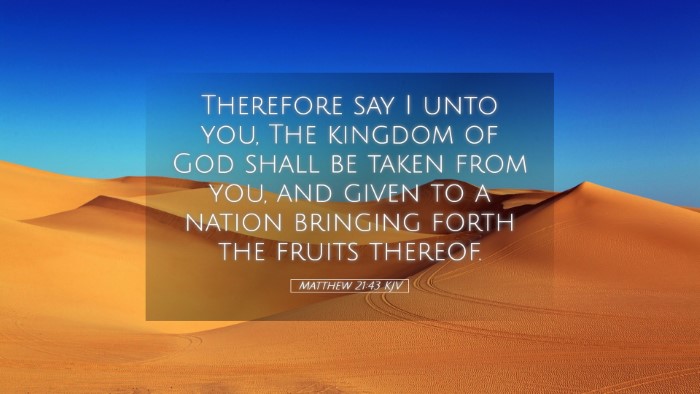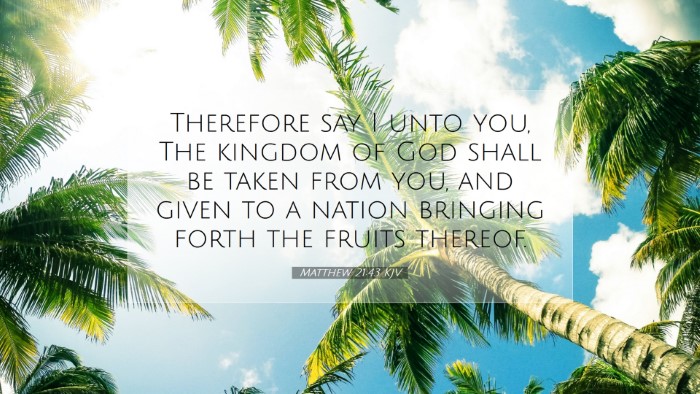Bible Commentary on Matthew 21:43
Verse Reference: Matthew 21:43 - "Therefore I tell you that the kingdom of God will be taken away from you and given to a people producing its fruits."
Contextual Background
This verse occurs in the context of Jesus' authority and His teachings regarding the religious leaders of Israel. In the preceding verses, Jesus speaks about a vineyard, an allegorical reference to Israel, highlighting the unfaithfulness of its leaders and the consequences of their rejection of God's prophets.
Matthew Henry emphasizes the significance of this act as a declaration that the Jewish nation, once the primary recipient of God's covenant, would be supplanted by the Gentiles, who would embrace the Gospel and bear the fruits of faith.
Exegesis and Interpretation
Adam Clarke interprets this verse as a profound warning to the Jewish leaders. It illustrates the transition of God's favor from Israel to a new community, which includes all those who genuinely respond to God's call. Clarke notes that the "fruit" symbolizes the good works and genuine faith that should accompany true discipleship.
In his view, the "people producing its fruits" refers not only to the Gentiles but to anyone who commits to following Christ's teachings with sincerity and dedication. This echoes the themes of inclusivity and the breaking down of barriers within the Kingdom of God.
Theological Implications
Albert Barnes presents this statement as a significant theological turning point. He asserts that the phrase indicates a divine judgment, where God’s kingdom should no longer be associated exclusively with Israel due to their continued rebellion against God’s messengers.
Barnes highlights that this is not just a promise of loss for Israel but a major revelation about God's broader plan of salvation — whereby all who believe in Christ, regardless of their nationality or prior status, are welcomed into the Kingdom. This broadening serves to fulfill the Abrahamic covenant in which all nations would be blessed through Abraham's lineage.
Practical Application
This verse serves as a poignant reminder to Christians regarding the fruitfulness of their faith. The call is for a reflective self-examination concerning what it means to live out the teachings of Christ. Matthew Henry admonishes believers to take heed of how they respond to God's call and the urgency of producing spiritual fruit, suggesting that the greatest danger lies in complacency and presumption.
- Self-Reflection: Believers should regularly assess their faith journey and productivity in spiritual matters.
- Embracing All Nations: The church is called to reach out beyond traditional boundaries and embrace diversity within the community of believers.
- Active Participation: Every believer has a role in advancing the Kingdom through actions that align with Jesus' teachings.
Conclusion
Matthew 21:43 not only critiques the religious leaders of Jesus' time but also serves as a transformative invitation to all who pursue a relationship with God. Through various public domain commentaries, it becomes clear that this verse is a multi-layered announcement of judgment and hope — a call to produce fruit in the Kingdom that transcends ethnic and social divisions.
The essence of this passage lies in understanding God's ongoing plan for humanity, emphasizing that true allegiance to Him is demonstrated through love, service, and faithfulness, irrespective of one’s background. It urges all readers — pastors, students, theologians, and scholars alike — to engage actively in the work of the Kingdom, ensuring that they are among those who bear fruit for God's glory.


